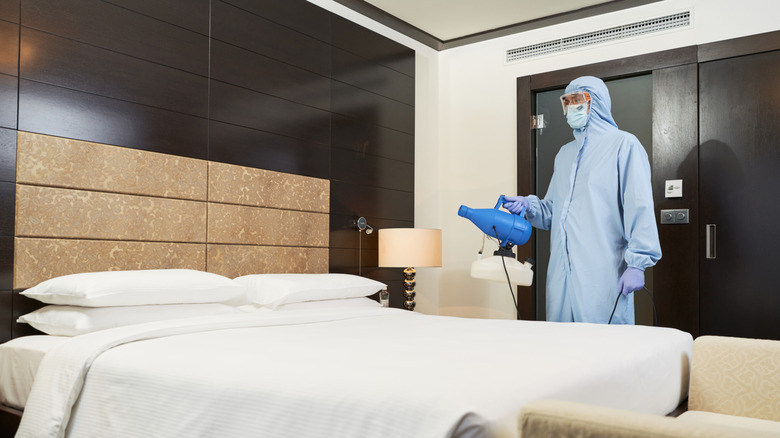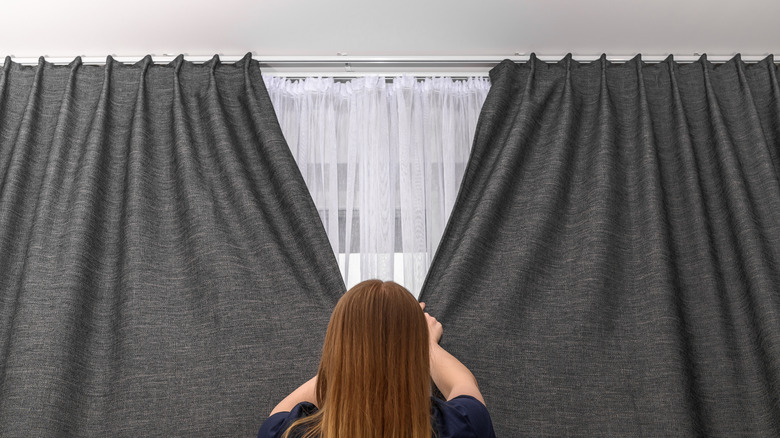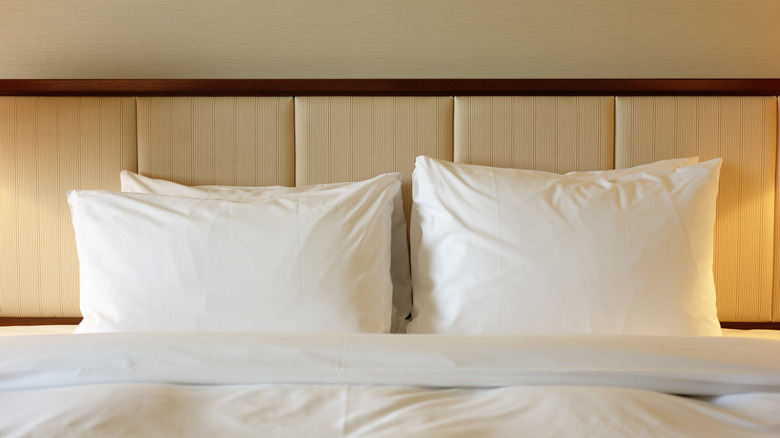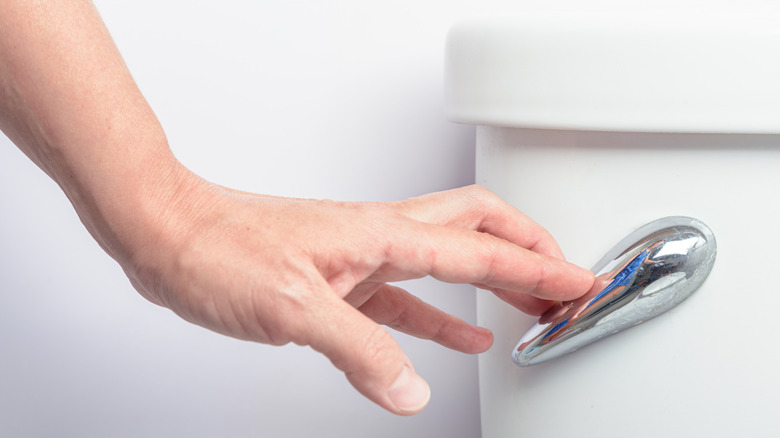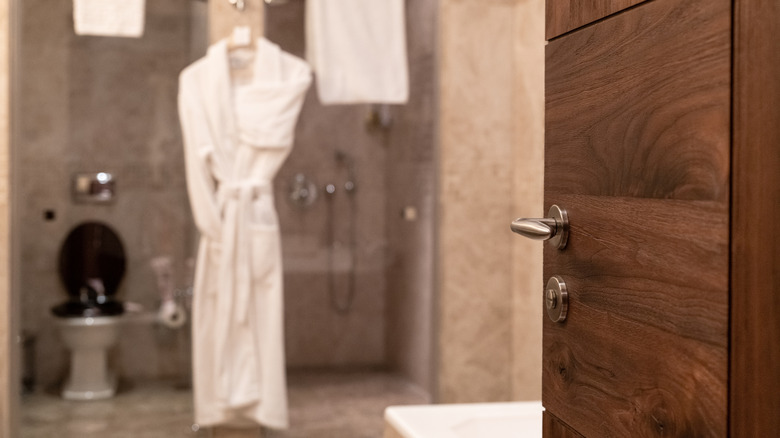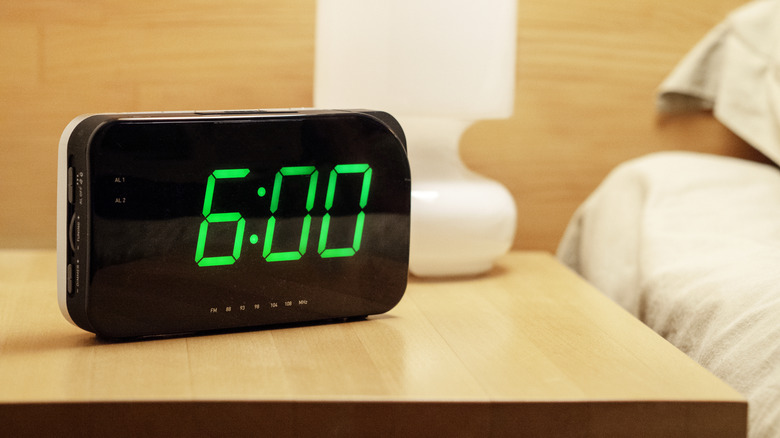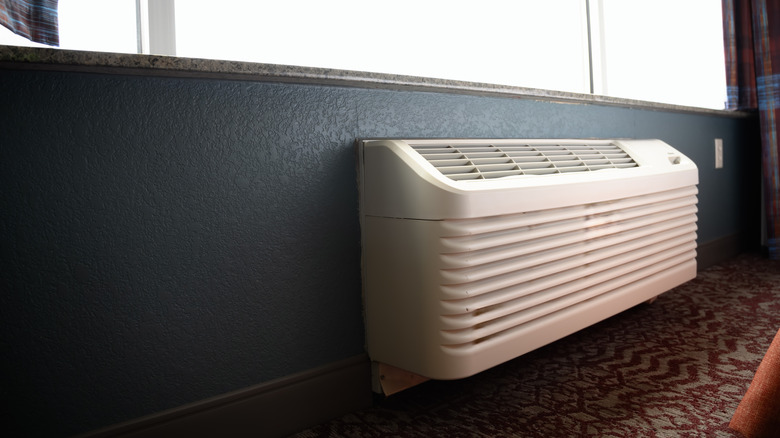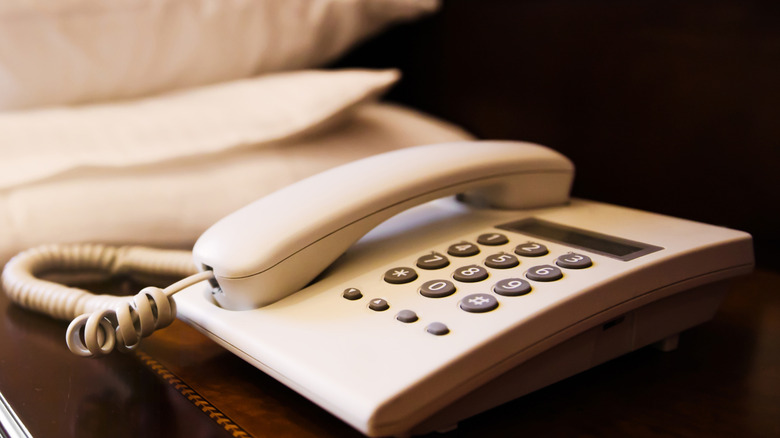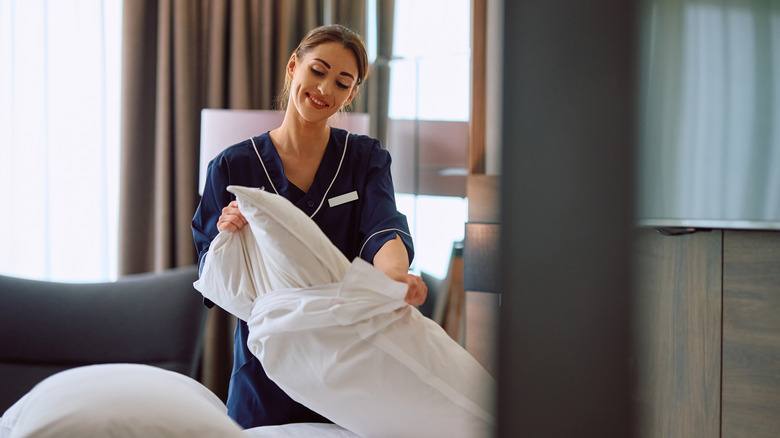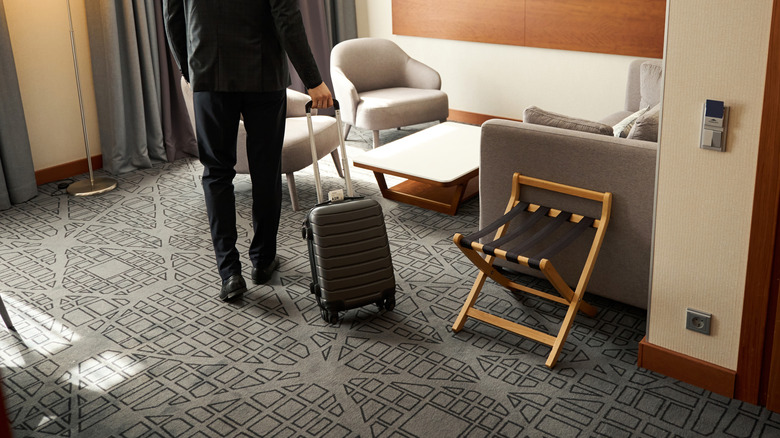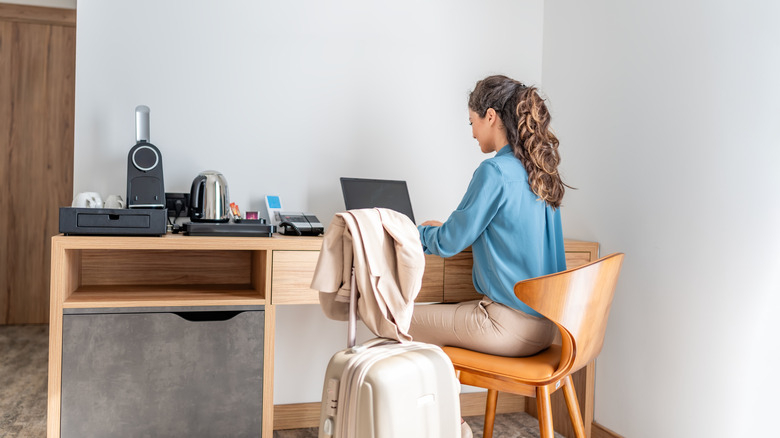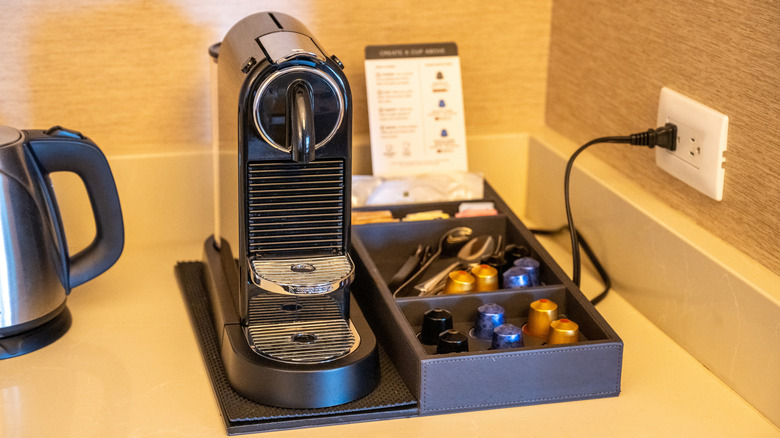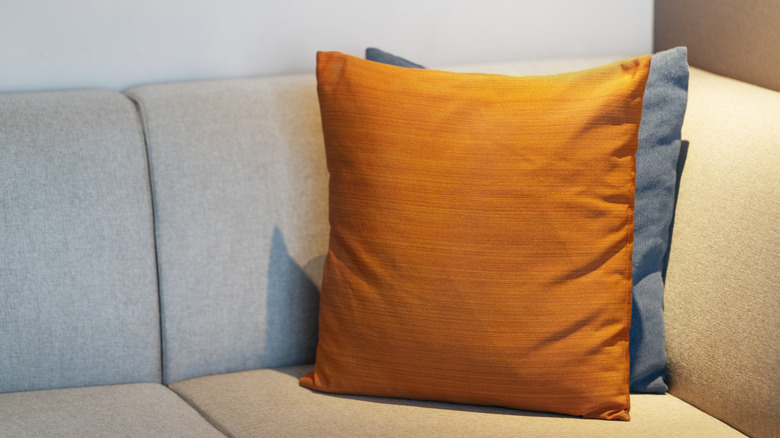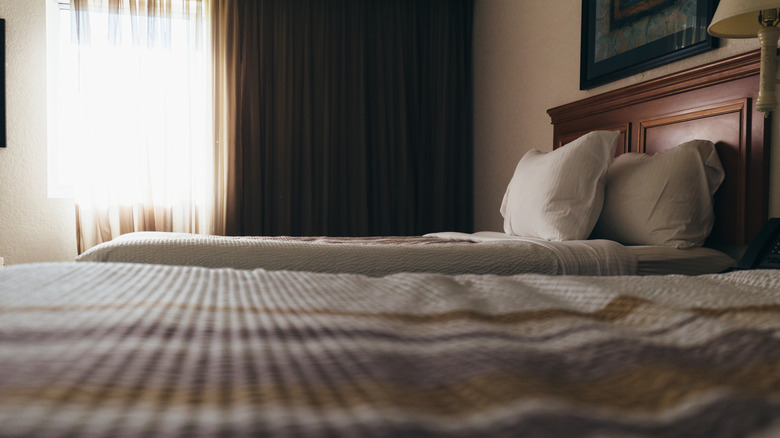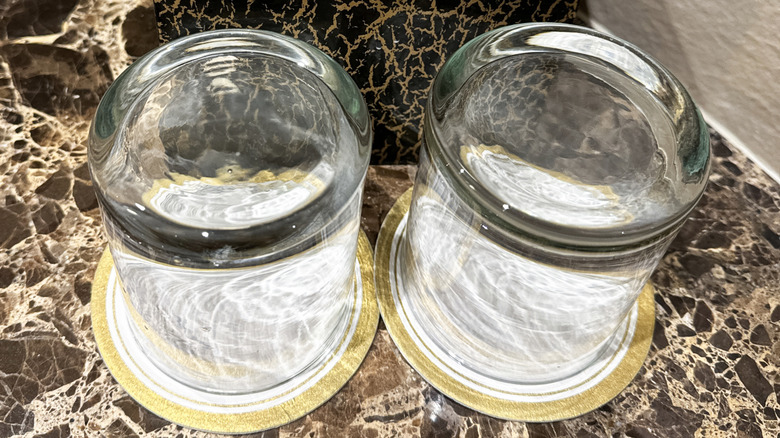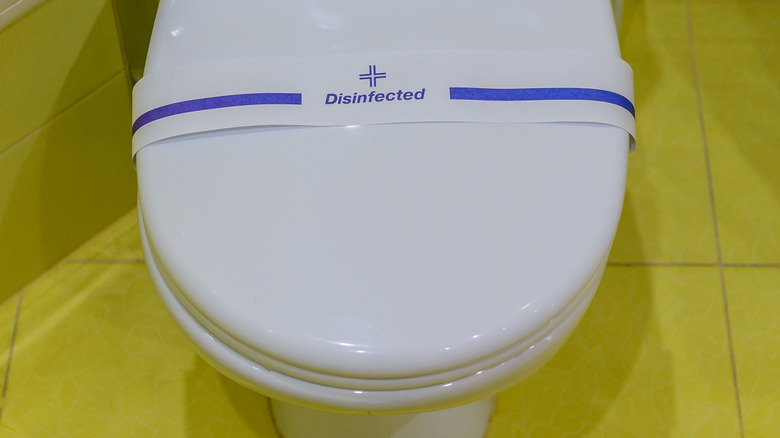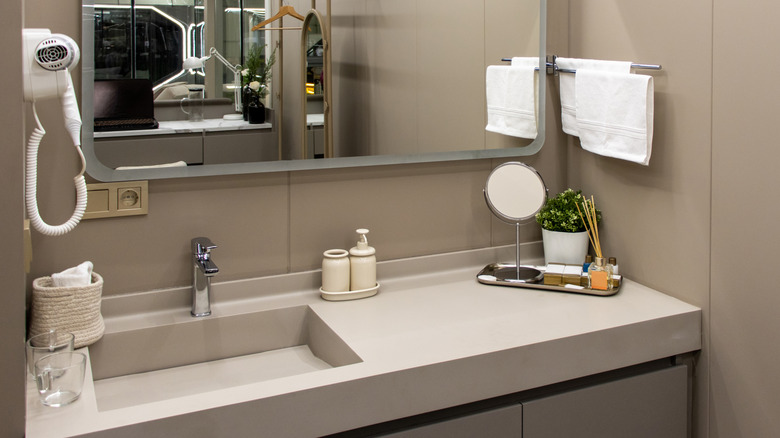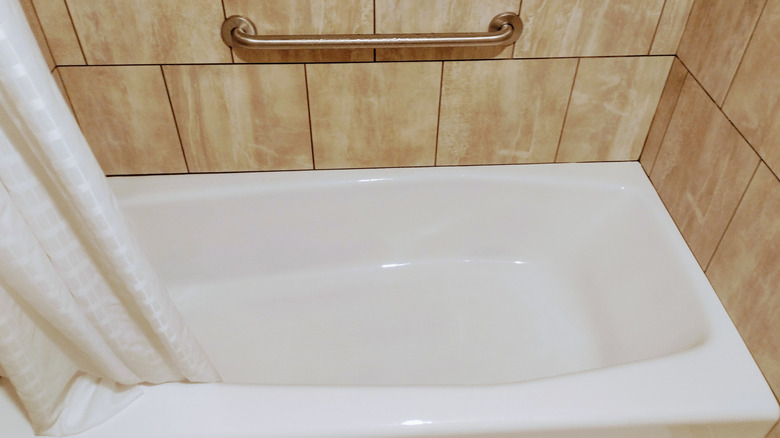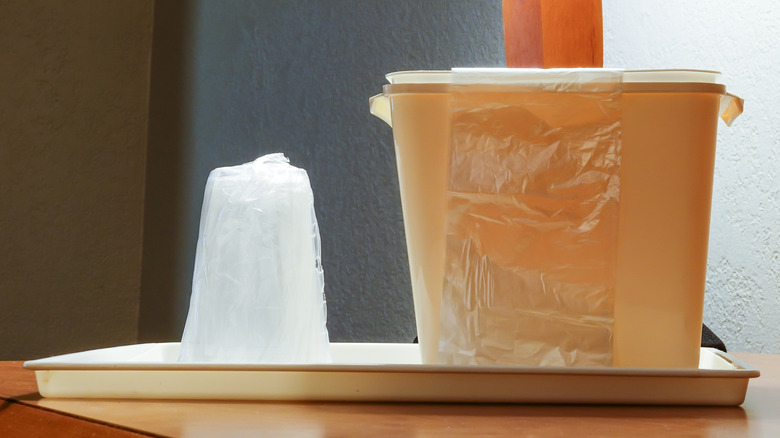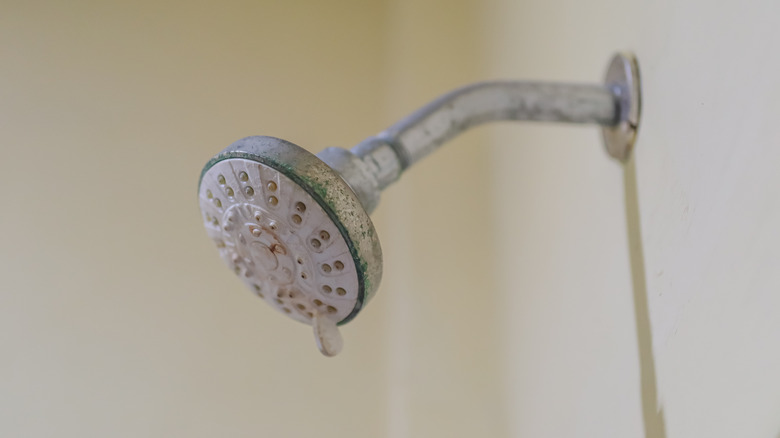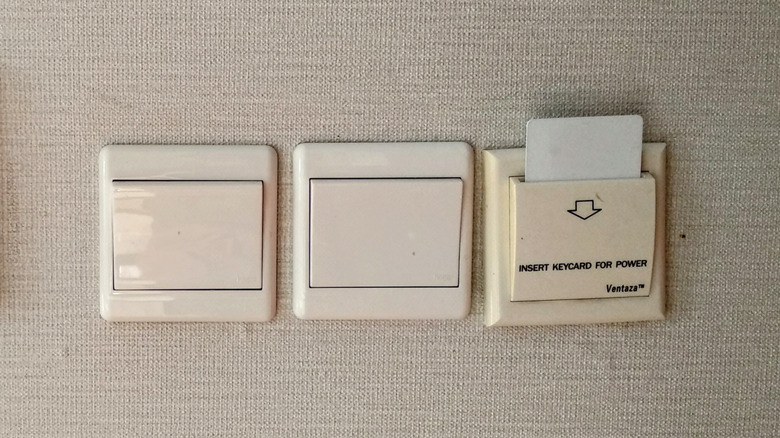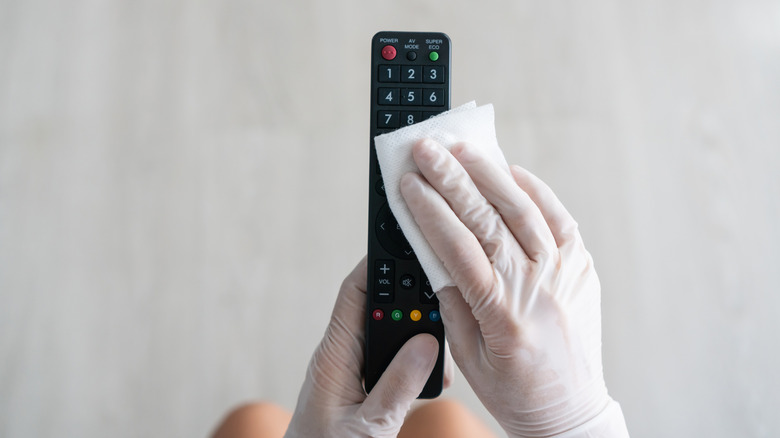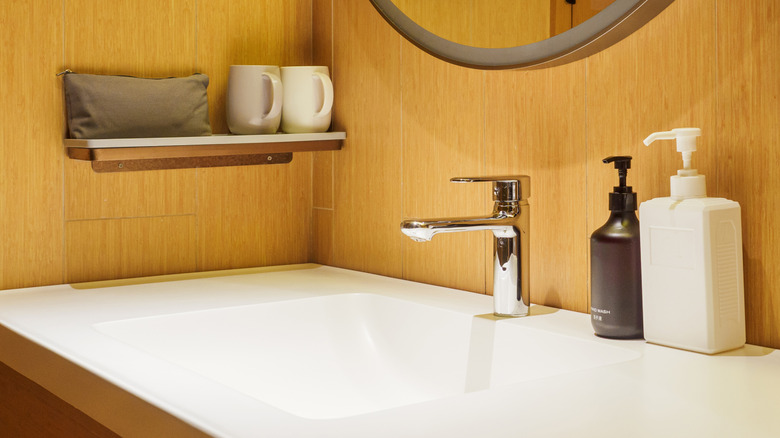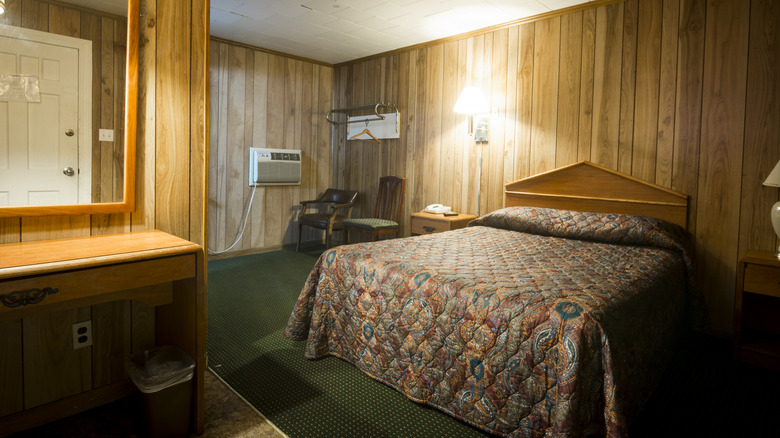The Dirtiest Surfaces In A Hotel Room, Ranked
It's exciting when first walking into a hotel room. After fumbling with the door handle, you step inside and giddily look around at the amenities — the king-size bed, the fancy coffee maker, the gleaming bathroom fixtures. Amid this excitement, it's easy to forget that these items harbor countless bacteria, viruses, and other disgusting pathogens ... and by the way, germs from that aforementioned door handle are now crawling all over your fingers.
Unless you're the very first guest in a newly opened hotel, it's almost certain that your room is teeming with microbes and filth left behind by previous occupants. Housekeepers may strive to disinfect all surfaces, but they can generally only dedicate a half hour or less to cleaning each room, meaning that many corners might be cut in the process. Furthermore, it's common for housekeeping staff to inadvertently transfer germs from room to room with bacteria-laden sponges and mops.
Even when paying top dollar for a luxury hotel, chances are high that your room is rife with microorganisms (and possibly not-so-micro organisms). Other than sanitizing everything yourself immediately after check-in, there's not much you can do about this — other than learning which hotel room surfaces are the dirtiest and approaching them accordingly. The following ranking of rank objects in hotel rooms is based on ample research, as well as personal experiences of hotel employment and staying in accommodations ranging from five-star resorts to dodgy flophouses; learn more about the countdown's methodology at the end of this article.
22. Curtain rods
It's probably not surprising that curtain rods rank among the least filthy items in hotel rooms. Considering that these fixtures are out of reach for many guests, most people aren't touching them, and you likely won't be handling them yourself. However, considering how many other items require cleaning in every room, housekeepers might not bother to regularly clean the curtain rods — and this poses a problem.
While curtain rods may have minimal bacteria, they do collect dust. This means that colonies of dust mites can be swarming up there. Opening and closing the curtains will send dust particles (and mites) airborne to float throughout the room, before they eventually check in to your lungs. Not ideal.
21. Headboards
Hotel guests spend many hours sleeping directly below the headboards of beds. While these surfaces can be frequently touched, they're often easy to clean, so they rank fairly low on this list. Yet headboards can provide comfortable lodgings for other hotel occupants: Bedbugs.
These unwelcome creatures take shelter behind headboards and multiply there. Since hotel-room headboards are often fixed to the wall, it's difficult for pest-control workers to check and treat these areas. You probably won't be able to look behind headboards for bedbugs, so your best bet to avoid them is booking hotel rooms that feature simple metal or wooden headboards, providing minimal crevices where these nefarious critters can hide.
20. Toilet flush handles
Okay, this one might be surprising. Considering what we do with our hands immediately before flushing, toilet handles can be some of the germiest spots in every hotel room. Thankfully, hotel management is aware of this, so housekeepers are instructed to disinfect toilet handles every time they clean a bathroom.
As a result, studies find that hotel room toilet handles are actually much cleaner than many items that receive less attention from housekeeping staff. Your own cell phone probably harbors more bacteria than an average flush handle — even in public restrooms. That may be a relief to keep in mind the next time nature calls.
19. Bathroom door handles
Any hotel room door handle is a hotspot for germs. Still, the bathroom door handle seems more prone to ickiness than most fixtures. Since everyone needs to touch these communal surfaces shortly after taking care of business, we can only hope that those who went before us washed their hands.
Fortunately, housekeeping staff are specifically instructed to regularly disinfect bathroom door handles. One legacy of the coronavirus pandemic is heightened awareness about the importance of cleaning these surfaces. So, it's likely that the bathroom door handle will be less germy than many other objects in your hotel room ... can that be considered good news? We'll take what we can get.
18. Alarm clocks
This hotel room amenity scores a fairly low place on the list thanks to its increasing irrelevance. Hotel guests frequently consider in-room alarm clocks more of an annoyance than a necessity since cell phones provide the same service. However, any past guest who was touching the alarm clock — say, while angrily trying to shut it off when it unexpectedly blared at 4 a.m. — was likely doing so with hands recently used to scratch sweaty parts during sleep.
Housekeepers are instructed to check and reset hotel room alarm clocks. Nonetheless, hospitality industry insiders consider this as a frequently overlooked task. A housekeeper with no time to reset the alarm clock might also not bother to clean it. If there is even a clock in the room in the first place, obviously.
17. Air conditioning units and thermostats
Now, these are hotel room devices that remain relevant to each guest. Temperature-control dials and buttons are almost certain to be fiddled with at least once during the course of every stay. This is true whether you're at a motel with a rattling wall-mounted air conditioning unit or in an upscale resort with a high-tech thermostat.
Regrettably, the unsanitary factor of hotel HVAC systems doesn't end with its control panel. Air conditioning units often harbor mold, and fungal spores are designed by nature to go airborne. Furthermore, instead of housekeepers, it's typically hotel maintenance workers who are responsible for cleaning out HVAC units, and you can bet that this time-consuming task isn't carried out daily.
16. Hotel room phones
This is another 20th-century anachronism found in modern-day hotel rooms. Cell phones have largely made landlines obsolete, but many guests still consider hotel room phones as essential amenities. After all, this is the conduit for such classic hotel experiences as ordering room service or conferring with a concierge about arranging show tickets.
That said, every time a guest uses the hotel room phone, they're pressing the headset right up to their ear and mouth, all while grasping it with their fingers. This makes every call to the front desk an invitation for germs to jump from the phone's many hard-to-clean nooks onto your skin. Now that's a wake-up call.
15. Sheets and pillowcases
In a perfect world, hotel housekeepers will change the sheets and pillowcases before every new guest arrives. News flash: This ain't a perfect world. Over the years, countless hotels have drawn suspicions of allowing housekeepers to save time and minimize laundry loads by reusing uncleaned bed linens between different guests.
According to an infamous Inside Edition investigation, hotel management was caught red-handed when permitting this practice at multiple hotel brands in New York City. Notably, this undercover operation occurred in June of 2020 — while the pandemic was raging, and hotel cleaning procedures were supposed to be especially strict. Hotel guests can generally expect clean sheets in their room, but it's always worth taking a quick look for telltale hairs (or worse, stains) before diving into bed.
14. Carpets
When staying at luxury hotels, guests are frequently provided with complimentary slippers. However, if you'll be occupying less prestigious lodgings, it's even more important to bring your own in-room footwear. Hotel room carpets are notoriously filthy, and you won't want to take a chance on exposing bare soles to the many microbes lurking below.
There are many causes for hotel room carpets to be disgusting and reasons why it's hard for housekeepers to keep them clean. Between high foot traffic and spills of assorted fluids, previous hotel guests leave myriad marks on fabric floor coverings. Nonetheless, slippers rank among the most common items people forget to pack, so make sure to have a pair in your suitcase.
13. Desks
A hotel room desk serves many purposes. Business travelers may work there for hours as they sweat over a big presentation, while bachelors and bachelorettes might transform a desk into a sloppy smorgasbord for meals delivered to salve raging hangovers. Other guests may use the desk as a storage space for dirty underwear.
All of this is to say that hotel desk surfaces may be anything but clean, and housekeepers don't always sanitize them thoroughly between guest stays. Don't forget this unpleasant fact if you're eating at a hotel room desk, and a piece of food falls from your plate onto the workspace — you can forget about the three-second rule. It's well worthwhile to clean the desktop yourself with a disinfecting wipe before doing anything.
12. Coffee makers
It's pleasant to start your day in a hotel room with a freshly brewed cup of coffee. It's not so pleasant to consider that in-room coffee makers are prone to harboring bacteria, yeast, and other nasty microbes. These machines need regular cleaning with vinegar or special descaling solutions, and a housekeeper in a hurry might decide to skip this multi-step task.
There's an even more worrisome possibility when using a hotel room coffee maker. Law enforcement officers warn that these are sometimes used for brewing a more powerful stimulant: illegal methamphetamine. At least one family in 2015 reported (via AP News) being sickened by meth residue that was left behind in a coffee pot at an Omaha hotel room.
11. Throw pillows and upholstered furniture
Hotel room sheets and pillowcases are (hopefully) changed between guest stays. However, uncovered throw pillows and upholstered surfaces on a hotel room's cushioned seating are cleaned much less frequently — if ever. Many hotel guests know this and immediately toss any throw pillows onto the floor for the duration of their stay, increasing their filthiness.
Guests who don't mind touching these rarely disinfected plush surfaces leave behind bodily fluids and dead skin cells, which attract hungry dust mites. The more multicolored the upholstery, the more likely that pattern was chosen specifically by hotel management to hide stains. This also applies to fabric-covered headboards, which can hide all kinds of teeny creepy crawlies.
10. Comforters and bedspreads
Similarly to a hotel room's upholstered surfaces, comforters and bedspreads are cleaned much less frequently than other pieces of bedding. This is particularly problematic because guests who are unaware of this housekeeping oversight may sleep on these cozy-looking blankets for hours, leaving behind dried drool and other secretions. On that note, let's choose not to think about another activity common on hotel beds.
Health and hospitality experts recommend taking no chances. Always avoid extended contact with hotel bedspreads and comforters. These can be removed from beds immediately after checking in and piled up on a sofa or another upholstered seat that you'd rather not use, anyway.
9. Drinking glasses
Oftentimes, hotels provide drinking glasses right next to the bathroom sink. Unfortunately, another amenity found by the bathroom sink is a toilet — and commodes are proven to spray bacteria throughout the bathroom with every flush. This is the unsettling reason you may want to avoid using the drinking glasses in your hotel room.
Sometimes, housekeepers make the situation even worse. There are numerous online reports of hotel staff using improper methods when supposedly cleaning drinking glasses, potentially spreading viruses onto these vessels. This may provide healthy inspiration to peruse the best travel water bottles that you can bring along whenever staying in a hotel.
8. Toilet seats
Considering that almost every hotel guest uses the toilet multiple times, and in light of what they do there, the seat must automatically be considered as a ring of germs. Housekeepers should certainly be sterilizing the toilet seat every time they clean a hotel room. This also applies when rooms are freshened up daily for guests staying multiple nights.
Fecal matter on toilet seats can cause norovirus. Nonetheless, because it is cleaned so frequently, this surface is actually less disgusting than a lot of other bathroom fixtures. For example, researchers found that in many hotel rooms, the toilet seat was considerably cleaner than a gross hotel hair dryer.
7. Sinks and counters
Many revolting substances end up in hotel room sinks. From soap scum to toothpaste-saturated spit, there are numerous causes for bathroom sinks to harbor microscopic creatures. These fixtures provide plenty of damp recesses for all kinds of pathogens to hide in and thrive.
Because of this, if you drop your toothbrush into a hotel room sink, drop it again in the trash. Toothbrushes are among the freebies you can ask for at the hotel lobby, so take advantage of this even if it entails walking to the front desk — especially in an upscale hotel. Believe it or not, a study by Travelmath determined that, on average, bathroom sink counters at four- and five-star hotels were germier than at lower-ranking accommodations.
6. Bathtubs and shower curtains
Bathtubs are frequently damp environments, making them perfect breeding grounds for bacteria. Every time a hotel guest takes a shower, the tub is coated with dead skin cells and microorganisms contained within. Housekeepers may attempt to clean all bathroom surfaces fully, but bathtubs and shower curtains still rank among the most stubbornly cootie-covered areas of hotel rooms.
This is partially because the sponges and mops used to clean bathtubs are frequently infested with germs from other rooms. This is also because people do some pretty squicky things in the shower, whether alone or with others. Furthermore, shower curtains are especially prone to developing mildew stains, an unsightly hallmark of poorly run hotels.
5. Ice buckets
If only they were exclusively used for their intended purpose, ice buckets would be a fairly harmless hotel room feature. Sure, they might attract some airborne mold spores when moist. But this is the least of our concerns with hotel room ice buckets — their recurring role of moonlighting as vomit receptacles makes them best avoided.
When they aren't sanitized, ice buckets are known to welcome buzz-killing pathogens like salmonella and E. coli, along with any stomach bugs deposited there by previous guests. There's a good reason why ice buckets are generally presented with plastic liners. Still, even touching the bucket's exterior when carrying it to the ice machine can be a vile prospect.
4. Shower heads
Few people realize that their own shower head is likely teeming with microbes — and this fixture can be even more rife with germs in a shared bathroom. Researchers have found multiple types of infection-causing bacteria in hotel room shower heads. These include pathogens that cause Legionnaire's disease, eye infections, and digestion issues.
The biggest problem with shower heads is that they take considerable time and effort to clean. You might get around to doing it at home a couple of times each year, but how likely will hotel housekeepers manage to take care of this regularly at a roadside motel? If your hotel room shower head is coated in limescale, it almost certainly contains abundant bacteria.
3. Light switches
Anyone determined to examine a hotel room and discover its nastiest surfaces will likely start this search by turning on the lights. But with that act, the search is mostly over. You see, light switches rank highly among some of the grossest spots in hotel rooms you shouldn't be touching.
Researchers from the University of Houston (as reported by NBC News) tested diverse hotel rooms for germs and found that the light switches were consistently more contaminated than most other surfaces. The repulsive results uncovered a much higher proportion of fecal bacteria on hotel room light switches than on toilet seats. So, right after checking in, cleaning every light switch yourself with disinfecting wipes is always a bright idea.
2. TV remotes
As enjoyable as traveling can be, there are many horrifying details about almost all hotel rooms that we have little choice but to accept. One of the most repugnant hospitality industry factoids is that shared TV remotes are especially germ-infested. Multiple studies identify tube clickers among the very most bacteria-riddled objects in any hotel room.
Housekeepers might attempt to disinfect a hotel room remote control. However, considering the many crannies inherent to each device, this is largely a futile effort, since microbes can burrow deep between the buttons. There's no point in trying to disinfect the TV remote yourself — just bring a clear plastic bag and keep the remote inside when using it throughout your stay.
1. Sink faucets and handles
The humble bathroom sink faucet takes the contamination cake when it comes to harboring the most bacteria in a hotel room. According to analysis by WaterFilterGuru, a testing sample from a hotel sink faucet can indicate the presence of some 30,000,000 colony-forming units of rod-shaped bacteria "commonly associated with hospital-acquired infections." Canada's CBC news agency also tested hotel room surfaces and found higher readings of germs around a bathroom faucet than anywhere else.
Microbes can thrive around the tap because of the regular contact with unwashed hands, cross-contamination with germ-infested cleaning materials, regular exposure to toilet flush spray, or the constant presence of moisture. Germ-sheltering limescale can also build up here, similarly to shower heads. But you don't usually drink straight out of a shower head — and maybe after reading this, you won't drink out of hotel room faucets, either.
Methodology
This ranking of dirty hotel room surfaces (ordered from the least contaminated objects to the filthiest) was not arranged strictly according to scientific data, but the order was roughly deduced from ample research of hospitality industry studies and reputable media reports. Additionally, personal memories from multiple jobs at varied hotels played a role in determining this countdown of contaminated room surfaces. Last but not least, countless stays at myriad international hotels — ranging from deluxe waterfront resorts to run-down roadside motels — certainly imparted many memories of unhygienic hospitality that finally came in handy when writing this ranking.
